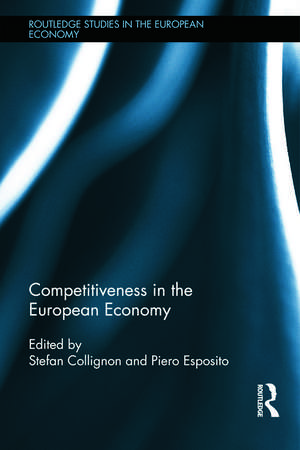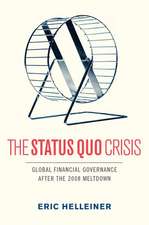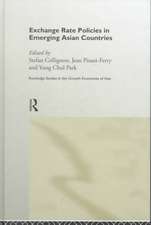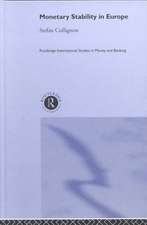Competitiveness in the European Economy: Routledge Studies in the European Economy
Editat de Stefan Collignon, Piero Espositoen Limba Engleză Hardback – 30 ian 2014
The first part of this book analyses macroeconomic imbalances based on a new framework from the analysis of the flow of founds rather than balance of payments, and presents an alternative measure of unit labour cost comparisons to investigate the relationship between imbalances and competitiveness. The second part is dedicated to the analysis of the trade performance of Germany and Italy and the sustainability of the German model in the EMU. The third part describes the reform policies implemented by Germany and their effect on imbalances; this includes wage moderation, the labour market reforms and weak labour demand. The final part explores the regional inequalities within Germany and Italy, providing useful lessons regarding fiscal federalism and regional banking developments.
In conclusion, a big part of the problems within the Euro Area are generated by the use of a wrong framework of analysis, where the EMU is considered as a fixed exchange rate regime and not a single country. This book provides an alternative view which holds at the core the relationship between sectors. It is stressed throughout the book that the German behaviour has contributed to the rise of imbalances between countries due to its growth model, not suitable for a big developed country in a currency union. This book also finds that stressing banking integration within countries helps to reduce regional inequalities, which has important implications for the management of Europe’s future banking union and macroeconomic imbalances.
| Toate formatele și edițiile | Preț | Express |
|---|---|---|
| Paperback (1) | 381.98 lei 6-8 săpt. | |
| Taylor & Francis – 30 iun 2020 | 381.98 lei 6-8 săpt. | |
| Hardback (1) | 848.15 lei 6-8 săpt. | |
| Taylor & Francis – 30 ian 2014 | 848.15 lei 6-8 săpt. |
Din seria Routledge Studies in the European Economy
-
 Preț: 324.39 lei
Preț: 324.39 lei -
 Preț: 303.89 lei
Preț: 303.89 lei - 20%
 Preț: 148.76 lei
Preț: 148.76 lei - 9%
 Preț: 934.49 lei
Preț: 934.49 lei -
 Preț: 311.41 lei
Preț: 311.41 lei -
 Preț: 316.32 lei
Preț: 316.32 lei - 18%
 Preț: 1057.13 lei
Preț: 1057.13 lei - 18%
 Preț: 1058.65 lei
Preț: 1058.65 lei - 16%
 Preț: 338.33 lei
Preț: 338.33 lei - 25%
 Preț: 524.78 lei
Preț: 524.78 lei -
 Preț: 494.48 lei
Preț: 494.48 lei - 26%
 Preț: 764.62 lei
Preț: 764.62 lei -
 Preț: 466.07 lei
Preț: 466.07 lei - 28%
 Preț: 823.63 lei
Preț: 823.63 lei - 18%
 Preț: 1057.09 lei
Preț: 1057.09 lei - 26%
 Preț: 819.48 lei
Preț: 819.48 lei - 26%
 Preț: 846.50 lei
Preț: 846.50 lei - 18%
 Preț: 1049.99 lei
Preț: 1049.99 lei - 18%
 Preț: 1004.20 lei
Preț: 1004.20 lei - 18%
 Preț: 1332.21 lei
Preț: 1332.21 lei - 31%
 Preț: 765.43 lei
Preț: 765.43 lei -
 Preț: 223.01 lei
Preț: 223.01 lei - 18%
 Preț: 703.79 lei
Preț: 703.79 lei - 28%
 Preț: 847.50 lei
Preț: 847.50 lei - 18%
 Preț: 699.96 lei
Preț: 699.96 lei - 25%
 Preț: 828.12 lei
Preț: 828.12 lei - 18%
 Preț: 1159.70 lei
Preț: 1159.70 lei - 18%
 Preț: 1174.70 lei
Preț: 1174.70 lei - 18%
 Preț: 1057.89 lei
Preț: 1057.89 lei -
 Preț: 484.47 lei
Preț: 484.47 lei - 18%
 Preț: 711.10 lei
Preț: 711.10 lei - 26%
 Preț: 848.15 lei
Preț: 848.15 lei -
 Preț: 413.13 lei
Preț: 413.13 lei - 26%
 Preț: 849.65 lei
Preț: 849.65 lei - 28%
 Preț: 875.55 lei
Preț: 875.55 lei - 31%
 Preț: 762.58 lei
Preț: 762.58 lei - 18%
 Preț: 1437.35 lei
Preț: 1437.35 lei - 18%
 Preț: 1108.37 lei
Preț: 1108.37 lei -
 Preț: 495.09 lei
Preț: 495.09 lei - 15%
 Preț: 703.48 lei
Preț: 703.48 lei - 31%
 Preț: 763.81 lei
Preț: 763.81 lei
Preț: 848.15 lei
Preț vechi: 1178.39 lei
-28% Nou
Puncte Express: 1272
Preț estimativ în valută:
162.32€ • 168.83$ • 133.100£
162.32€ • 168.83$ • 133.100£
Carte tipărită la comandă
Livrare economică 15-29 aprilie
Preluare comenzi: 021 569.72.76
Specificații
ISBN-13: 9780415712323
ISBN-10: 0415712327
Pagini: 232
Ilustrații: 116
Dimensiuni: 156 x 234 x 18 mm
Greutate: 0.48 kg
Ediția:1
Editura: Taylor & Francis
Colecția Routledge
Seria Routledge Studies in the European Economy
Locul publicării:Oxford, United Kingdom
ISBN-10: 0415712327
Pagini: 232
Ilustrații: 116
Dimensiuni: 156 x 234 x 18 mm
Greutate: 0.48 kg
Ediția:1
Editura: Taylor & Francis
Colecția Routledge
Seria Routledge Studies in the European Economy
Locul publicării:Oxford, United Kingdom
Public țintă
Postgraduate and UndergraduateCuprins
Introduction PART I European imbalances and competitiveness 1. Taking European integration seriously: competitiveness, imbalances, and economic stability in the Euro Area 2. Unit Labour Costs and Capital Efficiency in the Euro Area: a new competitiveness indicator PART II Competitiveness and external trade 3. Is Germany’s model of export-led growth sustainable in a currency union? 4. Intra-European Imbalances, Competitiveness and External Trade: a comparison between Italy and Germany PART III The German model of labour market reforms 5. How promising is wage restraint for a large economy? The example of Germany before and during the current crises 6. Hartz IV and the Consequences: Did the Labour Market Reforms Destroy the German Model? 7. Hartz IV and the German model. A Comment 8. German reforms as a blueprint for Europe? PART IV Regional development: the Italian Mezzogiorno and former East Germany 9. Fiscal Federalism: What Lessons can Italy Learn from Germany? 10. Economic Development in East Germany since German Unification: Results, Shortcomings and Implications for Economic Policy 11. Mezzogiorno and Neue Bundesländer: what lessons can Germany learn from Italy?
Descriere
Competitiveness has become a major issue in the European debate as differences in the competitive position of the member states are considered to be one of the main causes for the Euro-crisis and the macroeconomic imbalances within the Euro Area. However, there is still no consensus on the best way to measure competitiveness. This book provides an up to date analysis of the causes of European imbalances by comparing Germany and Italy, two key countries of the Eurozone.
Notă biografică
Stefan Collignon is a Professor of Economic Policy at Sant Anna School of Advanced Studies, Pisa, Italy
Piero Esposito is a Post-Doctoral Researcher at Sant Anna School of Advanced Studies and researcher in internationalisation and international trade at Centro Europa Ricerche (CER), Italy
Piero Esposito is a Post-Doctoral Researcher at Sant Anna School of Advanced Studies and researcher in internationalisation and international trade at Centro Europa Ricerche (CER), Italy


























